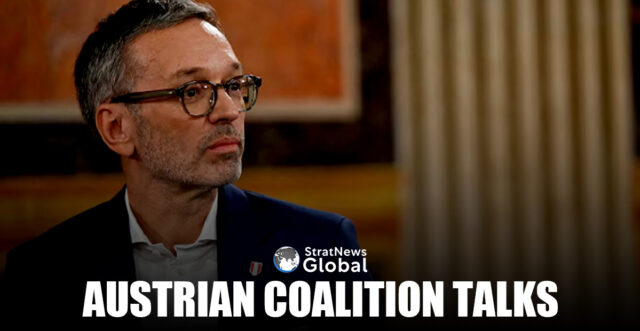Negotiations led by Austria‘s far-right Freedom Party (FPO) to form a governing coalition seemed on the verge of collapse on Wednesday, as the FPO and the conservative People’s Party (OVP) rejected each other’s proposals and exchanged blame for the deadlock.
The eurosceptic, Austria’s far-right and Russia-friendly party FPO is seeking to lead a coalition government for the first time since it was founded in the 1950s under a leader who had been a prominent Nazi.
Hard-Line On Immigration
The FPO came first in September’s parliamentary election with around 29% but was only tasked with forming a government last month once a centrist attempt to do so without it failed. The OVP is its only potential coalition partner.
The FPO initially planned to reach a deal quickly since it overlaps with the OVP on many issues, particularly taking a hard line on immigration. But the mood soured as it became clear the FPO was making many demands that were always going to be difficult or unacceptable for the OVP.
“This shows that we are not power hungry. It is more than fair, unless the OVP wants to govern alone,” the FPO said in a statement on Wednesday outlining a proposed division of ministries between it and the OVP.
The FPO’s insistence that it controls both the finance and interior ministries has been a major obstacle in the talks, as has a laundry list of demands such as exceptions to sanctions against Russia or challenging the primacy of European Union court rulings.
FPO Rejects OVP Suggestion
The OVP published its own suggestion on ministries that the FPO quickly rejected. It also said the FPO had not addressed its demand that fundamental matters be guaranteed, such as the rule of law, the absence of Russian influence, and Austria being a “reliable partner to the European Union”.
The FPO replied that those principles included points the parties’ leaders needed to discuss but “the OVP refused to have this discussion because it wanted to have the issue of ministries conclusively resolved first”.
Such finger-pointing is exceptional since the parties had agreed not to unilaterally make details of their talks public. It suggests they are no longer able to hold such discussions behind closed doors, or that they may be more concerned with public perception as their talks falter, analysts said.
Should the talks collapse, either a centrist attempt to form a government will be revived or the Alpine republic will head towards a snap election with polls suggesting the FPO’s lead over other parties would grow.
(With inputs from Reuters)





